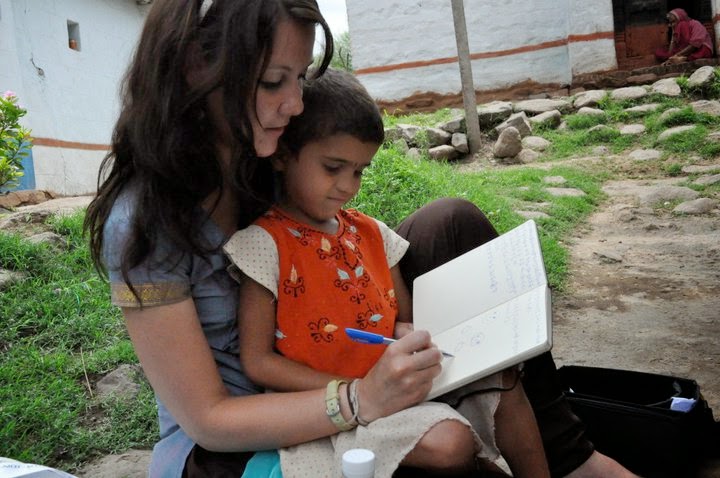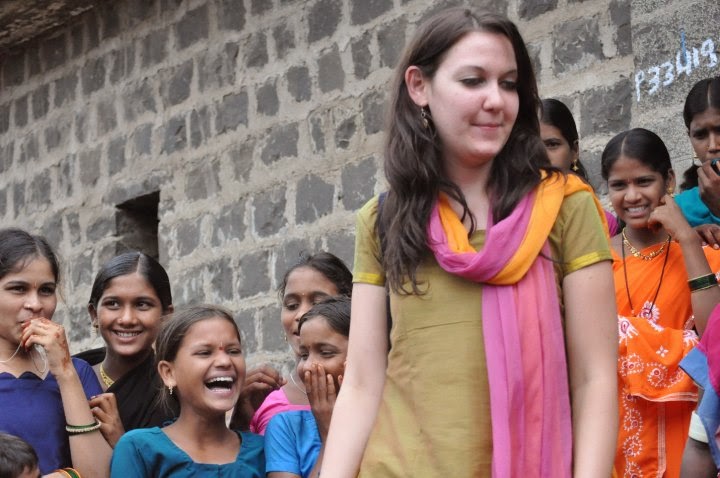Jenni Mahnaz is a writer and travels nomadically with her husband, Aaron. A passionate believer in our ability to create the world we live in, she runs the site WitnessHumanity.com as a chronicle of their journey, both physically and internally. Favorite countries include India, Nepal, and Belize. Her work can also be seen in various online publications including Bootsnall.com and Vagablogging.net. Stay tuned for her upcoming book!

Enjoying a break with a young student.
What motivated your decision to intern abroad? How/why did you choose where to go?
At the time, I was a graduate student in a UN Studies program, focusing heavily on children's rights. I was waffling back and forth between what I thought of the work the UN and UNICEF do around the world, and I was really unsure if I actually wanted to pursue a career with them in the future. Add to the the fact that my landlord needed to do some renovations and asked if I would be willing to vacate for the summer, and the recipe for a change of scenery started to take shape. I started to do some digging and stumbled upon an internship opportunity with UNICEf and KCCI in India. I did some quick math and realized I would actually save money over the summer if I participated, all while gaining real world experience working with UNICEF. It seemed like a no-brainer so I quickly gathered all the materials and set in the application that day - the deadline.
How did you find your internship? What resources did you use?
I started googling "UNICEF internship" and came up with this opportunity pretty quickly. I followed some links through and they led to the application process for this particular internship. After I found the internship, I also searched out some reviews from people who had participated and found that most people felt that they had gained something positive from the experience. I wish there was a more refined answer to this question, but in this case, Google was my friend!
What was your experience like? Can you share some favorite memories - and challenges?
The experience was actually extremely challenging - but not for the reasons you might assume. I had been to India before and I was actually excited to be there during monsoon. The rain and the heat didn't bother me at all, and the culture was something I had already been exposed to. The real struggle was seeing first-hand how UNICEF operates on the ground. I was particularly disturbed by the conditions under which UNICEF was insisting children participate in programs. I have always recognized the very real barriers UNICEF, NGOs, and other organizations face in India and elsewhere, but something really did not sit right with me when I was interviewing children sitting on gravel floors, whose lunch had not shown up for the day, and whose teachers didn't even speak their same language, and I was supposed to push them for the "real" reasons they weren't showing up to school. There were very apparent assumption about why these kids weren't going to school on a regular basis and not one of those reasons was reflected in any consistent manner in interviews with the parents or students. When we reported this back to UNICEF, some staff told us the people we were working with were "backward" and didn't know what they were talking about. In the end, they refused to acknowledge our findings because it didn't fit their narrative. It was really eye opening. I still hold an immense amount of respect for the work the UN and UNICEF do, but I did realize the human limitations to what they do and I learned to not idolize any organization. I also struggled a great deal with the disparity between where I spent my days (scheduled tribe and scheduled caste villages) and where we all gathered for meetings (the UN office and/or a beautiful, air conditioned convention center). I learned a lot about myself and what my views on disparity are, but I also opened myself up to a whole host of new questions.
Despite these challenges, I also made some incredible memories. I became good friends with one of my co-interns and we still talk regularly. I danced in the first monsoon rains of the season, drew pictures with kids who had never even met a foreigner, and learned a whole lot more about a country and a culture that I was already enamored with. I think my favorite, and simultaneously most heartbreaking memory, was sitting with a little girl named Shivani during her lunch break. We had already met her in another village but her parents had sent her to live with an aunt so that she might get a better education. When she saw us, she came running over and we drove her home while her school friends gaped after her. She was tickled by that reaction and couldn't stop giggling. When we arrived, a small crowd gathered and we had a few minutes to talk with her teacher and her aunt. Her aunt told us she would do her best to take care of Shivani because she knew Shivani was bright and needed a better education than she could get in her former school. Her new teacher threw praise down on her and told us, in all seriousness, that he couldn't believe how smart she was given what village she was from. When asked if she could become a doctor like she wanted he replied, "it's compulsory. But she needs an English medium school or she will never get there." It's my favorite memory because this little girl was just beaming at having a teacher rain praise down on her. Her teacher was utterly convinced that she was exceptional and for this little girl from a small village, that was an intense confidence booster. She couldn't have stopped smiling if she tried. It was heartbreaking because I realized that what the teacher said was true- the reality of education in India meant she needed an English medium school- and she would likely never get that need met. I also felt saddened that the teacher had initially written her off because of where she was from, and I wondered how many other students of his were slipping through the cracks because of bias, assumptions, and differing learning styles. The fact that she was being forced to live away from her parents, by default of her circumstances, in order to pursue an education was a reality I still grapple with. That's a lot of weight for a little girl.

Young students receive their first slates. They will use them throughout their school career to practice writing and math.
What skills did you develop from your experience? Do you feel changed from your experience abroad?
So much! Working with a team of people is often a challenge. Doing the same in 100+ degree weather, with regular torrential downpours, with a team from incredibly diverse backgrounds, while wrestling with your own moral compass, all while walking miles upon miles in the sun to get the job done, is beyond challenging. Every experience changes you in some way. This particular experience brought me closer to a sense of clarity about what I wanted from life, what expectations I had of organizations I align myself with, and what kind of world I want to live in. It also helped me open myself to more questions about who I am, what I believe, and what I am willing to give up to realize the world I believe can exist. It wasn't a perfect experience, but it was a powerful one.

Interviewing students about their school experiences.
Has your experience helped you get to where you are today?
This internship made me realize that working for UNICEF was not what I wanted- at least not right now. In order to work for such an organization, you need to have the ability to compartmentalize to a certain degree and to accept certain realities in hopes that one day, maybe very far down the road, things might change. I'm not able to do that right now, so I am not a great candidate to work in such an organization. This realization led me to choose a less conventional life, but one I love! My husband and I now travel nomadically and we have created a life that suits us perfectly. I've learned to stop fighting my idealism and stop waiting for a great big organization to "fix" everything. Change starts on a much smaller scale and that's where I am most comfortable existing right now. Had I not taken this opportunity I may have blindly followed the career path I thought I wanted, without any first hand experience of what that might look like.
Any advice for students thinking about an internship overseas? What are some highlights or things that you gained or changed your perspective after this internship ended?
An international internship is an incredible opportunity to learn about a field of work and about yourself. You may think you know what the field or job will entail, but until you get on the ground and start navigating the culture, you have no idea! It can be a very humbling experience. I am immensely grateful for the opportunity I had through the UNICEF and KCCI internship. It may not have been what I anticipated, but I see that as a good thing. When we are faced with unexpected circumstances we truly find out where we stand and what we believe- and there certainly is no shortage of unexpected circumstances when interning abroad!

All photos courtesy and copyright Jenni Mahnaz
